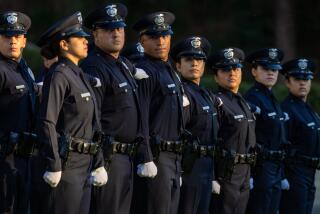Irvine Reserve Unit on Guard Against POWs’ Mistreatment
- Share via
IRVINE — It was another sign of the threatened war in the Persian Gulf.
As members of the five-man Army reserve unit based here packed their chemical gas masks and other gear Friday for a Sunday morning departure to Fort Ord, they knew their eventual mission in Saudi Arabia would be vastly different from that of the nurses, doctors, weapons-support groups and other troops that have already left.
Part of the job of the 440th Military Police Detachment is processing prisoners of war, but its main task is teaching American troops how to properly handle enemy prisoners, a duty some GIs may be prone to abuse when emotions run high in the heat of a battle arena.
“If it’s Americans who are running the camp, we would be training American units on how to capture or how to process American-captured prisoners of war,” 1st Lt. John Bazan, a 29-year-old UCLA law student, said Friday, “If the host nation or any other nation that’s part of the alliance was running the camp, then we would be acting in the capacity of ensuring that any American-captured prisoners of war are being treated in accordance with the Geneva Convention.”
If it is not an American camp, the unit “would never tell whoever is holding the prisoners what to do,” Bazan said, but would report possible violations to commanding officers.
For decades, the guidelines set by the Geneva Convention have dictated the humane treatment of POWs.
“What it basically boils down to,” Bazan said, “is that they are not being mistreated, that they have enough food, clothing, shelter.”
The deputy head of the International Committee of the Red Cross delegation headquartered in New York said the guidelines also mandate that prisoners have access to medical treatment and exercise and can correspond with family members.
The committee official, Fred Isler, said that as the United Nations’ Jan. 15 deadline for Iraq to unconditionally withdraw from Kuwait approaches, his organization has been advising nations to adhere to the Geneva Convention rules if war breaks out.
“If there’s going to be trouble, let’s keep the damage as low as possible and follow the rules which exist,” Isler said.
Tom Grant, of UC Irvine’s Global Peace and Conflict Studies Center, said the United States is under additional pressure to treat prisoners fairly because “Arab countries are kind of touchy” about the issue and because worldwide news media attention will focus on any problems that arise.
“They (Arabs) feel we could care less for Arabs, that Westerners are inherently racists when it comes to Arabs,” Grant said.
American military officials have previously sent out guidelines for troops on how to treat prisoners and how to remain calm when handling enemy soldiers, but the 440th is one of the first units designed to actively monitor those guidelines.
The Marines, for example, have distributed among troops thousands of small cards detailing how POWs should be processed. Prisoners should be secured, searched for documents, silenced so they do not “coordinate false stories,” and safeguarded from harm from combat or at the hands of angry soldiers or civilians, according to the processing guidelines.
The 440th, Bazan said, was created just a year and a half ago and is a relatively new operation for the reservists.
“We are kind of just learning ourselves,” he said of the operation they will monitor.
“I think there’s more training on how to keep the prisoners of war from escaping than there is in keeping Americans from being rough with them,” Bazan said. “There’s more emphasis on ensuring that the prisoners of war are behaving.”
Officials said they did not know how many POW-monitoring units have been deployed.
“We will be leaving for Saudi Arabia whether or not shots are fired,” Bazan said. While prohibited by the military from revealing when the unit would leave Fort Ord for the Persian Gulf, he hinted that it would be before the Jan. 15 deadline.
Before being activated Thursday, members of the unit--including military police officers, a staff photographer, fingerprint specialist and an interpreter fluent in Farsi--led separate lives as a law school student, mailman, truck driver, delicatessen owner and a Los Angeles County sheriff’s deputy.
Although the reservists probably will not be at the battlefront and will not be charged with guarding the prisoners, they are aware of the task at hand and are ready to get on with it.
Staff Sgt. Rick Bartoli, 43, an El Toro postal worker who will serve as the company photographer, served in Vietnam but said he never expected to be activated from reserve status.
More to Read
Sign up for Essential California
The most important California stories and recommendations in your inbox every morning.
You may occasionally receive promotional content from the Los Angeles Times.













